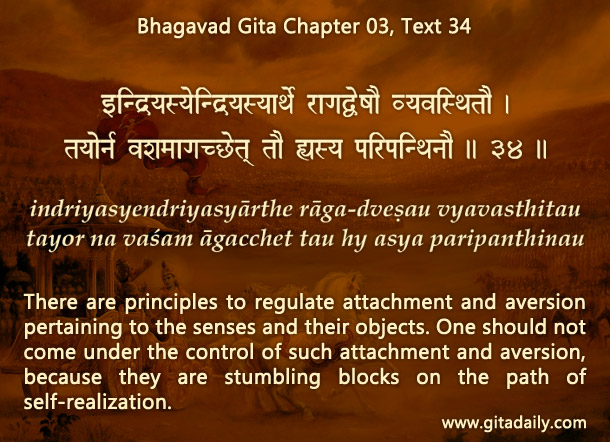At the start of the Bhagavad-gita, Arjuna is overcome by myriad complex emotions that bring him on the verge of an emotional breakdown.
By the end of the Gita’s first chapter, Arjuna is laid low by his emotions even before his enemies have shot a single arrow. It is in this context of a fearless warrior being reduced to tears and trembling that the Gita’s central spiritual message is spoken.
The Gita explains that we all are eternal souls meant for an emotionally rich life of immortal love with Krishna. Our present emotions, however, are frequently triggered by temporary material things. That’s why Gita wisdom urges us to let our lives be guided not by emotion, but by reason – by reason founded in scriptural wisdom.
Scriptural guidelines take our emotions into account, prescribing injunctions according to our psychophysical nature. Yet even while doing our emotionally compatible prescribed duties, scripture cautions us against letting the emotions be the only things in the account. The Gita (03.34) warns against letting our default attachments and aversions be the sole determinant of our behavior. As such emotions are not intrinsically connected with our spiritual essence, they can, if unregulated, lead us spiritually astray. Actually, unregulated emotions can mislead not just spiritually but also materially.
To help us find complete emotional fulfillment, Gita wisdom unambiguously endorses bhakti-yoga. This yoga of devotion connects us with Krishna, the all-attractive, all-loving Supreme Person. Even while we are still practicing devotees, bhakti-yoga offers glimpses of the emotional fulfillment that awaits us ahead.
Being inspired by such glimpses if we steadily follow the path of devotion paved by the fences of scriptural reason, we can eventually attain Krishna’s abode, where love reigns supreme and the heart finds everlasting fulfillment.


Without being consciously connected to the depth of the ocean the mind is tossed by the waves on its surface like a yo-yo. The flow of interaction of our senses with their objects is inherently imprinted and even Lord Brahma is not exempt from this samkara. Srila Sridhara Swami comments in this context that ‘the Vedic scriptures instruct one to offer all actions in worship to the Supreme Lord which will neutralize the dualities of attraction and aversion for sense objects and absolve one from all reactions.’
Hello friends
I just want to thank you Hans,for giving your experience, strength and hope in helping me better understand the the dualistic of attraction and aversion. This is exactly where I am at right now, in this new level of awareness. I needed this friends. Thank you for allowing others to,post so we can all learn fro one another. Class has been good for me today….thanks….thanks….thanks…